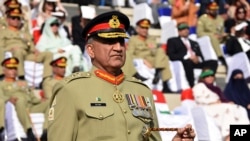A security expert from the Afghan-Pakistan region said Pakistani officials are blaming unrest on Afghan refugees in a bid to divert attention from the real causes of militancy.
At a security conference in the German city of Munich Saturday, Pakistan's chief of army staff Gen. Qamar Javed Bajwa said the repatriation of Afghan refugees could greatly help in curbing terrorism in the Pak-Afghan region.
"We still have nearly 2.7 million Afghan refugees in our country, whose concentrations are routinely used by TTA (The Afghan Taliban) and the Haqqani network to recruit, morph and melt (disappear into the refugee population). It is time for these refugees to be repatriated with dignity.It is the only way we can ensure that no one is misusing our hospitality and soil for mischief in Afghanistan," Bajwa said.
But Said Alam, a security affairs expert based in Pakistan's Federally Administered Tribal Areas that border Afghanistan told VOA that by pointing to the presence of Afghan refugees as a major cause, Bajwa tried to divert the world's attention from Pakistan's own "shortcomings" in taking effective steps against militant groups.
"Who are the foot soldiers of Jaish-e-Mohammad? Afghan refugees have nothing to do with the groups that are nurtured by [the] Pakistan army," Alam said. Jaish-e-Mohammad is a militant group blamed for several attacks in Indian-administered Kashmir.
Afghanistan and the United States said Pakistan offers safe haven to the terrorist groups that launch attacks inside Afghanistan, a charge Pakistan denies.
.
Hamid Saeed, former chief of Pakistan's military intelligence and a defense analyst, told VOA that Bajwa's statement regarding the Afghan refugees should be seen in the right context.
"There is evidence that terrorists hiding among the Afghan refugees were behind most of the recent terrorist attacks. Terrorists cross into Pakistan and stay in the refugee camps, making it humanly impossible to carry out any sort of surveillance," he added.
Saeed said the logical solution to terrorism was for Afghan refugees to go home. But Dr. Ijaz Khattak, an international affairs expert, told VOA that mixing the refugee issue with terrorism is a poor strategy."This will further complicate the issue, and the international community is not going to buy this narrative," he told VOA.
On Saturday, Afghanistan's president, Ashraf Ghani, pledged to bring back all refugees in Pakistan in "the next 24 months," saying it will put an end to allegations the displaced community is a source of regional instability.
Pakistan hosts millions of Afghan refugees, half of them undocumented, and has been pressing for an early repatriation of the displaced population, saying their presence "helps Afghan terrorists to melt and morph among them."
"In the next 24 months, my priority and goal is to bring back all Afghan refugees in Pakistan," Ghani said in a televised speech Saturday. "We don't want them [Pakistanis] to say refugees do this or do that. [We know] refugees are innocent. So, let us resolve to bring them back to solve this problem once and for all."
Ayaz Gul, Nasir Mahmood Nasir contributed to this report.




